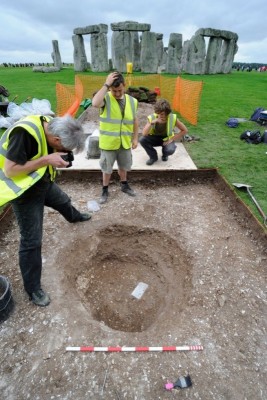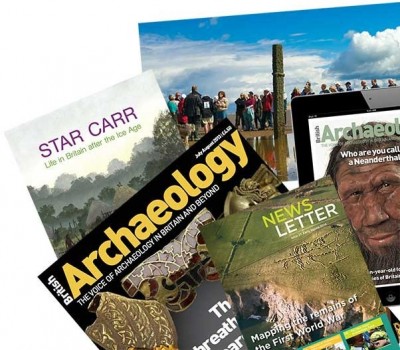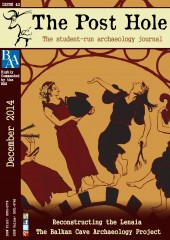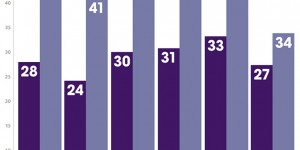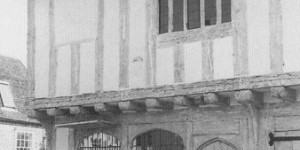The Council for British Archaeology is one of the most renowned archaeological institutions within the UK. I am sure that almost every reader is aware of the council or its successful bi-monthly magazine; British Archaeology. The CBA’s aims coincide with something I am extremely passionate about, to ‘involve people in archaeology and to promote the appreciation and care of the historic environment for the benefit of present and future generations’.
The Council for British Archaeology was founded in 1944 aiming to be 'safeguarding of all kinds of archaeological material and the strengthening of existing measures for the care of ancient and historic buildings, monuments, and antiquities' by improving public education about archaeology. The CBA is now a registered charity in England, Wales and Scotland, and has a membership of over 5,000. If I was to list here all the activities and roles the CBA undertakes, it would be never ending.
When faced with the daunting prospect of finding a career, we are constantly reminded that experience is vital, whether it be through paid work, voluntary positions or fieldwork experiences. As students, we are reminded to make the most of our degrees and for those wishing to pursue a career within this sector finding sources of information on topics we are passionate about – archaeological groups, work experience and events – is fundamental. The CBA offers us, as a collective society and organisation active across the whole archaeology sector, an invaluable opportunity that I urge each and every one of you to grasp with both hands. Where else can you expand your historical and archaeological understanding through such a vast collection of research and experiences, meet such influential people who can impact upon your life, or be educated and inspired as an individual within a larger community?
Aside from producing British Archaeology, the CBA offers a vast array of information and opportunities to become involved with archaeology. The CBA’s programmes actively seek to involve the public in archaeology and a myriad of associated activities.
The CBA and me
Over the course of my three years as an undergraduate, I tried to take as many opportunities as I could. In my third and final year, I was part of this inspiring journal, and whilst volunteering at the Yorkshire Museum within the Historic Library, I represented the department as an Undergraduate Careers Representative. At the same time I was completing my studies in the hope of gaining the grades necessary for a Masters in Cultural Heritage Management. I have experienced at first-hand how enthusiastic and approachable the CBA team is. I was privileged to work with former CBA policy expert Dr Gill Chitty at the CBA’s York office, located on Boothham Lane. Having approached the organisation for some experience, I obtained a voluntary internship for six months, maintaining the Challenge Funding Scheme which in turn provided the opportunity to write for the April 2012 edition of British Archaeology. Aside from organising voluntary work experience and internships, the CBA offers voluntary opportunities and the chance to attain further skills, training and bursaries for those looking to initiate research or archaeological projects. You can join the CBA campaigns to voice your opinions or help to raise the profile of archaeology within local groups and societies for the enjoyment of future generations. Locally you are able to join a CBA group. CBA groups also encourage students to join their committees that include representatives from across the archaeology sector. Get some practical work experience on your CV through helping to organise events, write newsletters and help with social media, and get out into the community at new.archaeologyuk.org/join-a-cba-group.
The CBA also offers opportunities to become involved within events pivotal to educating the public about archaeology. The Festival of Archaeology took place between the 12th and 27th of July this year; it pioneered archaeology and involved educating and inspiring the public through events organized by museums, heritage organisations, national and countryside parks, universities, local societies, and community archaeologists. Over 1,200 events hosted a quarter of a million visitors across the UK, if you were not able to attend any you certainly missed a wonderful experience! More information on this annual event is available at new.archaeologyuk.org/festival-of-archaeology.
If you have not already become a member, what are you waiting for? The CBA offers a student membership rate at £21 (£1.75 a month) which results in a digital package of 21+ hours a week of archaeological material. The CBA offers discounts on outdoor and archaeology gear and has collaborated with leading publishers – so you get your reading list for less! Or even better yet, perhaps you are also considering joining the IfA (Institute for Archaeologists). The CBA offers a membership to both organisations for £30.75 (£2.56 a month) and highlights the package’s benefits as ‘Get a head start with your studies and future career with the complete package for student archaeologists’. Why not even introduce your friends to the CBA? The digital magazine, with searchable back library, covers all topics historical, archaeological, scientific etc. and it can be an interesting read especially for someone not necessarily undertaking a subject that relates to archaeology. With membership you will receive monthly eNews including special offers and project news. The CBA Introductory Membership costs £15.75 (£1.31 a month) and there are many other offers available, for more information visit shop.britarch.ac.uk/CBA-Membership/CBA-Student-Membership-Special-Offer/.
As some of The Post Hole’s readers are still in school or college – do not be deterred! The CBA offers an exciting club for you to be part of. The ‘Young Archaeologists’ Club is aimed at those aged up to 17 years old and administers with 65 local branches across the UK. To find the nearest one to you for hands-on archaeology, follow www.yac-uk.org/branches. Previously only available within the UK, come spring 2015 more content will be available online.
Aside from this, the CBA offers invaluable advice on progressing into a career within archaeology and associated disciplines. A priceless addition to the website, an information resource encompasses material on ‘what do archaeologists do?’ and ‘where do archaeologists work?’, ‘how to become an archaeologist’ and downloadable PDF factsheets. The website offers links to relevant companies and sites with job opportunities. Check out this page new.archaeologyuk.org/become-an-archaeologist, it contains a beneficial supply of information, which will remain invaluable throughout future years.
The aim of this article was to reinforce the importance of the relationship between the Council for British Archaeology and you! An organisation held in high esteem, they offer the public exceptional opportunities to become involved. As we are all passionate about archaeology and related disciplines, the website offers various prospects to cater for everyone’s interests and pursuits. Executed well, the website is easy to navigate and is constantly updated - check out the news page to keep up with the latest in British archaeology. The organisation remains at the forefront of this sector and hopefully, this article has demonstrated why (if you have not already) you should reconsider the role that the CBA plays in your life today.


